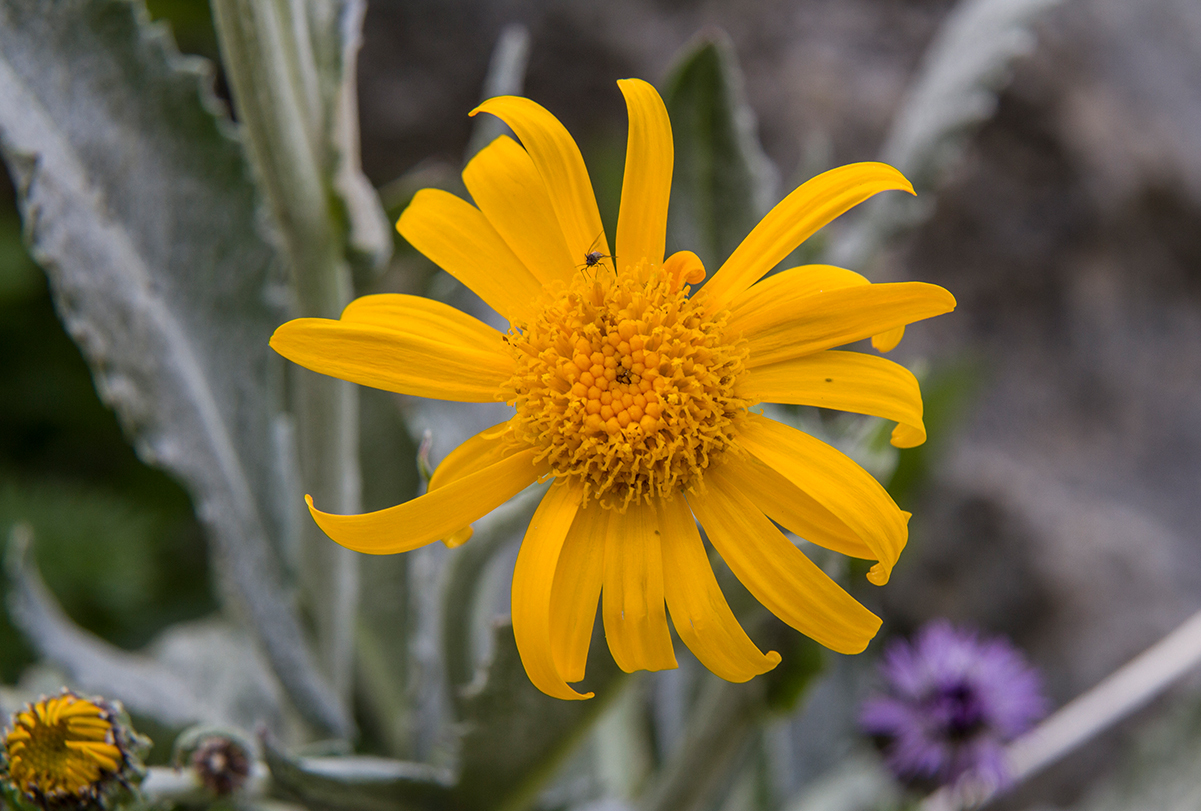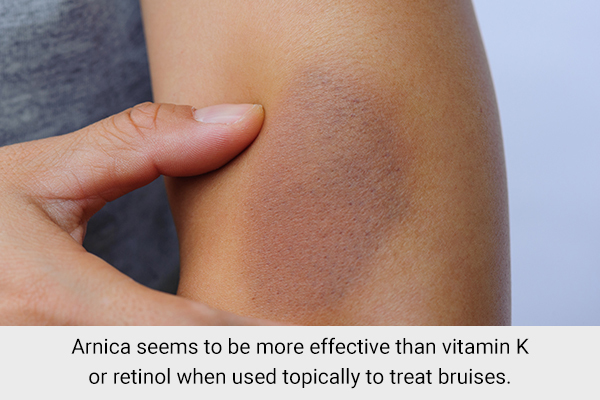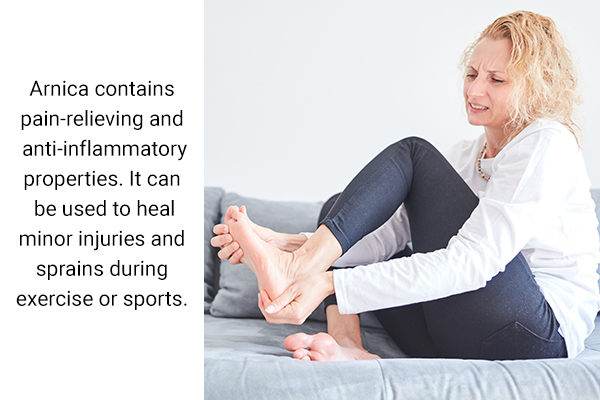In this article:
Arnica montana, also known as wolf’s bane, is a highly beneficial medicinal plant. The leaves and flowers of arnica have been used in homeopathic medicines for centuries. (1)

Most of the medicinal qualities of arnica stem from its high concentration of beneficial plant compounds such as linoleic acid, palmitic acid, and thymol. These potent compounds contain antiseptic, anti-inflammatory, and analgesic properties that make arnica extract a useful topical ointment in various conditions. (1)
Read on to learn about arnica’s many health benefits.
Health Benefits of Arnica
The health advantages of using arnica topically include the following.
1. Relieves arthritic pain
Arnica gel contains pain-relieving properties and can be used as a natural analgesic. The anti-inflammatory compounds in arnica also help reduce the inflammation and swelling associated with rheumatoid arthritis or osteoarthritis. (2)
Arnica gel has been proven to be as helpful as medicated creams such as nonsteroidal anti-inflammatory drugs (NSAIDs) in relieving the symptoms of arthritis. (3)
How to use:
- Take a little amount of arnica gel and massage it onto the bruise.
- Apply a warm compress to the bruise later.
2. Heals bruises

When applied topically, arnica improves blood flow to the area and can help fade bruises fast. It also contains pain-relieving properties and helps reduce swelling.
Using a 20% arnica ointment can significantly decrease bruise healing time.
Arnica also seems to be more effective than vitamin K or retinol when used topically to treat bruises. (4)
How to use:
- Add dried and crushed arnica leaves to a mason jar and fill it at least halfway. Add olive oil to this jar and let it rest in the sun for 2 weeks. Strain the oil and add 4–5 drops of arnica oil to it. Add a little more olive oil if needed. Massage this oil over the bruise for 5 minutes every day.
- Alternatively, you may use store-bought arnica gels or creams.
3. Works as a natural muscle relaxer
Arnica helps improve blood flow to strained muscles and helps them relax. It works as a mild analgesic that provides temporary relief from pain and inflammation when used topically.
Some studies suggest that arnica may also help prevent and treat muscle damage. (5)
How to use:
- Mix 5 drops of arnica oil and 2 tablespoons of sesame oil.
- Apply this mixture to the affected area.
- Massage for at least 5–10 minutes.
4. Heals sprained ankles

Arnica contains pain-relieving and anti-inflammatory properties. (1) It can be used to heal minor injuries and sprains during exercise or sports.
Arnica also helps promote blood flow to the area and prevents bruises.
How to use:
- Add 10–12 drops of arnica oil in 1 teaspoon of water.
- Apply this mixture to the sprained ankle.
- Massage the area for 5–10 minutes.
- Place a bandage over the ankle and let it rest for 4 hours.
5. Heals a black eye
Any dark bruise around the eye is referred to as a “black eye.” Arnica contains anti-inflammatory compounds such as phenolic acids that help fade bruises and reduce inflammation or swelling. (6)
How to use:
- Take a little amount of arnica cream and apply it under your eyes and to the bruise.
- Avoid getting the cream into your eye.
Note: If the cream gets into your eyes, quickly rinse them with cool water.
6. Promotes hair health

Arnica oil is an age-old remedy for hair loss and thinning. It boosts blood circulation to the hair follicles and nourishes them. Arnica also helps cleanse the scalp of debris and excess oil, thus rejuvenating it. (7)
How to use:
- Add 3–4 drops of arnica oil to your shampoo or hair oil and use it as usual.
- Alternatively, you can buy arnica-infused shampoos and hair oils.
Side Effects of Arnica
There are a few rare side effects associated with the use of arnica.
- Arnica is not advisable to be used during pregnancy or while breastfeeding.
- Do not apply arnica topically on any open wounds, cuts, or broken skin. (8)
- Arnica should not be consumed by mouth in any form as it is a poisonous plant that can lead to stomach issues or worse.
- Make sure you are not allergic to arnica before using it. Most people with allergies to daisies, chamomile, or any other plants in the Asteraceae family are also allergic to arnica. (8)
Final Word
Arnica is a medicinal plant that has been used in the treatment of various health issues for ages. It contains anesthetic and anti-inflammatory properties and can be used as a mild natural painkiller.
Consult your doctor before using arnica as it may interact with the allopathic medicines you use.
- Was this article helpful?
- YES, THANKS!NOT REALLY


